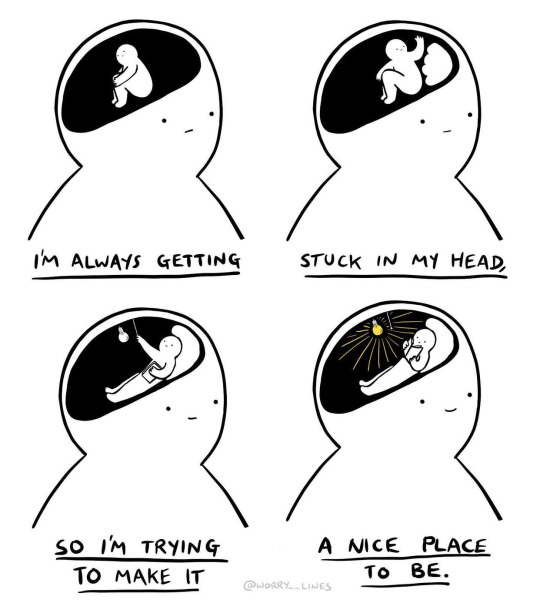Text
falling back into patterns and behaviours you thought you'd worked to overcome doesn't mean you've lost all your progress.
changing things we've been doing our whole lives takes time and it's perfectly fine if that's hard sometimes.
infact, learning to overcome setbacks is a part of recovery.
6K notes
·
View notes
Text
Sometimes self care is doing the hard thing. Sometimes it means getting up and going to work or school, even if it’s uncomfortable. Sometimes it’s going to see friends even if you want to stay under the cover. Sometimes it’s worth a little push for the sake of your healing.
4K notes
·
View notes
Text

Does anyone have this book and wanna start a group to break it down and seem less overwhelming?
#mindovermood#secondedition#changehowyoudeelbychangingthewayyouthink#dennisgreenberger#cheistineeapadesky#send help#overwhelming
0 notes
Text
*through gritted teeth* it doesn’t have to be perfect, it just has to be done. it doesn’t have to be perfect, it just has to be done. it doesn’t have to be-
150K notes
·
View notes
Text


"I think of you with the most excruciating tenderness."
– Vladimir Nabokov, from Letters to Véra
2K notes
·
View notes
Text
Reblog and say why the person you reblogged from is a good person
446 notes
·
View notes
Text
Don't Panic.
In Kelsey Darraghs' book, Don't F*cking Panic!, she gives a lot of good life lessons and a lot of relatable stories. I as someone with several mental health diagnoses and an undergo-er of the manic highs and lows, I know how hard or not hard it can be to read a book. And, not only a book but a self-help book at that. Darraghs' book also serves as a workbook with exercises, tips, tricks, and journal prompts. I personally purchased the book on kindle and have already utilized the printable resources in the back on numerous occasions, for myself and others.
Side bar for a second with me here guys, I read the whole book, have worked on the exercises, and even added bits from this book/workbook to my own "Tiffany ToolBook". I'm going to break apart some of the most important things that resonated for me personally or for me as a future Social Worker. I'll do my best to break apart the the things I pull directly, just in case some personal insight, more so than Darraghs' will help! To condense this I'll narrow it down to about 5-7 of the most important*(totally MY opinion) from the TiffanyToolBook and my future work resource book, this is hard enough to narrow down, the whole book is full of resources. BUT, I'm also aware that this is a lot in itself, so if you want me to elaborate or more direct resonating* (MY opinion) quotes just message me.
Here we go guys, let's begin with what I pulled for my own TiffanyToolBook! I'll break it down the best, simplest I can.
Quote 1: "I've found that just one sentence from a self-help book, or a meme from Tumblr, or something smart a friend said in passing, would strike a chord for me and come in handy the next time I was struggling."
This quote to me is so relatable and truly what I based my TiffanyToolBook off of. I wanted something, a journal of sorts, to really explain what my brain and mental health looked like. Most mental health professionals call it a "toolbox" but some of us need more than just a box, I need a whole notebook, and that's okay. I have random quotes from instagram, Tumblr, Pinterest, my sister, and previous mentors all throughout my TiffanyToolBook. For example, in my one of the most hard hitting quotes I repeatedly remind myself of and go back to is from my sister: "I love you more than your illness.". So your reminders and notes don't have to be pages long for them to be the most meaningful when you need it.
Quote 2: "I fear that my thoughts are too powerful for my brain to correct itself, and that these thoughts that take over are evil ones. And, I'm terrified, each day, that this "insane alter ego" is bubbling under the surface, just waiting to jump out at me. Out of nowhere. For no logical reason, you may be surprised to find out that this is a fear many high-anxiety sufferers have."
If you battle with mental health or have spoken with someone who does then you probably have an understanding of what "insane alter ego" Darragh is talking about here. Sometimes you just have to remind yourself that it's just a moment and intense emotions usually happen in bursts, lasting about 15 minutes.
Quote 3: "You are the awareness behind your thoughts- not the thoughts themselves. Did you exist before the thought occurred? Yep. Do you continue to exist after the thought leaves? Yes. Therefore, you can't be your thoughts. You are something greater! If you were your thoughts, you would disappear when the thought does."
Sometimes this is so important to remember because those thoughts, intrusive or not, can be so loud! I constantly have to visualize a stop sign sometimes just to make a train of thought(s) stop.
Quote 4: "Whenever you have an intrusive thought, remember, it's your second thought that counts."
For me this is important because my first thought is usually really negative or really dramatized. The second thought is more of a rationalization, so this is important tip to keep in mind.
Quote 5: "Sure, while trying to be perfect can help drive motivation and shape us to be the "go-getters" we are, it can also totally fucking ruin our ability to function, because we are constantly reaching for an end goal that doesn't exist."
I'm a perfectionist in almost everything I do, criticism is not my forte. Though even when I achieve what I think will bring me satisfaction, I crave more, even if I don't know what more is. I definitely have to be mindful about celebrating my victories, big or small.
Quote 6: "Experience your emotions."
Ugh, this is my favorite because it reminds me that sometimes you just have to ride that wave. I say that because the waves always level out, which means you or the emotion you are currently feeling will too.
And if you are still here with me then let's get to the quotes from my future Social Worker Resource book.
Quote 1: "Psychiatrist: can diagnose mental illness and prescribe medicine. Psychologist: can diagnose mental illness but they cannot prescribe medicine. Psychologists go to school longer than a therapist and often work with psychiatrists to monitor medication and changes. Therapists: provides support and guidance while helping patients make effective decisions within their overall structure of support."
This set of definitions is so important to know, yet, it's something that not a lot of people can differentiate. It's really important to know what type of mental health you need.
Quote 2: "In a series of experiments, Harvard neuroscientist Joshua Greene describes what he calls a 'dual-process brain'. He uses the analogy of a digital camera, which has an automatic made and a manual mode. The automatic mode in our brains is driven by emotions. It is fast and efficient. The manual mode requires reasoning to do its work. It is slower, just like changing manual settings is slower. Problems come, Greene argues, when we use the automatic mode in situations that call for manual mode thinking."
I thought this was important to include because it breaks it down into something simple. Sometimes it takes a simple shift to create the perfect picture.
Quote 3: "A helpful trick in managing rumination is giving your inner voice a name. They're the problem, not you! When you catch your critic acting up, you can blame it on them."
My inner mean girl's name is Sharon. My hormonal dragon is Puff the Magic Dragon. Name whatever persona you need to, I can 100% guarantee that it helps to be able to shift blame to process it. AND before you come to me for suggesting shift blaming, think about it, you're shifting the blame to yourself, just your inner mean girl or your inner hormonal dragon.
Quote 4: "We all need to treat ourselves the way we would treat our best friend when they're in need of some loving."
Sometimes this is easier to tell someone else than follow it, which I whole heartedly understand. I can't tell you that I always follow this, though I do try to be mindful. You have to love yourself too.
Quote 5: "Anxiety symptoms are a biochemical response; your body is turning thought into actual physical chemicals in your body, creating energy."
When I came to this realization, a bit slower than I'd like to admit, it helped me tremendously. I just associate anxiety with energy and I give myself something to do. I like to associate this tidbit with another quote that I heard from a professor "If you are bored you are boring.". This means to be that there is always something you can be doing, you should never be bored, especially because there is always something to learn, even if it's about yourself.
Quote 6: "Dissociation, by definition, is referred to as being disconnected to the moment. For someone who doesn't struggle with dissociative anxiety, they might try to understand dissociation by oversimplifying the feeling as "daydreaming" or "not paying attention". But when coupled with an anxiety disorder dissociating can be incredibly fucking terrifying! In fact, *party horns* its my most terrifying symptom! *pew pew pew* Diving deeper into dissociation, we have to meet its close cousins, who close out our 3 D's: depersonalization and derealization. Depersonalization is when your mind feels disconnected from your thoughts, feelings, actions, or body. Derealization causes a sensation where the world doesn't feel real."
I chose this one because dissociation for me is terrifying as well. I hate realizing I'm doing it but not being able to break away from doing it. It was reassuring to hear that I'm not the only one who gets scared from it, not to mention the other set of definitions are really beneficial when identifying what is really happening with you.
Quote 7: "Fight: can come from a place of aggression or anger while also feeling prepared. Flight: when you nope out but even if you run the feelings will catch up with you. Freeze: your body playing possum, can also cause memory loss. Fawn: not putting yourself or your needs first."
These definitions are important to know because they are the main responses to triggers or unexpected events. I've personally experienced all four and you can experience them all or a few of them. Personally, I'm a fawner but we are working on it!
Okay guys, if you made it this far, KUDOS. I truly am clapping for you. I hope these direct pulls, personal words of wisdom, and most importantly the spotlight here Darraghs' knowledge and words have helped you or can help you help someone else. I appreciate you reading from the bottom of little soul and if you'd like to chat about anything related to the post or not, I'm here. :)
#kelseydarragh#tumblarians#writers#currently reading#books & libraries#don'tpanic#anxiety#bipolar#depression#dissociation#dpdr#depersonalization#dissociating#actually traumatized#dissociative amnesia#selfhelp#personal development#mindset#self improvement#self development
1 note
·
View note
Text
“It is not that the girl is unfit for everything, it is that she is not of this world.”
— Gabriel García Márquez, Of Love and Other Demons
348 notes
·
View notes
Text
Self talk
Why is it crazy to talk to yourself?
I truly believe that you must whisper aloud or scream into the silence to be less insane. The only person who can and will listen will be yourself.
Sometimes self love is literally hugging yourself tight. It’s fluttering forehead kisses. It’s saying you’re good enough. For me.
Loneliness starts lengthy conversations at night, when an audience of shadows observe. Or a monologue and emotion, truths pour out.
My mind may be a world but if I stay in it, I will surely rot away.
From my peeling lips, stories spill. No one will hear them except for the universe, me, and the person sat across from me.
She likes my unusual antedotes. Her presences makes me warm.
When I mumble a song from the depths of my heart, they complete the melody. Then we dance! The perfectly imperfect jig!
Sobbing shaking cracking breaking. In her arms, I fall apart because everything is too much.
AHHHHHHHHHH! We bellow just to feel and it’s okay. Then my other half and I collapse, exhausted but laughing. Free.
Ok, maybe I’m a little crazy. Honestly aren’t we all. At least I feel a little understood, heard by someone. My heart is healing.
580 notes
·
View notes
Text
Don't self-isolate because you feel too awkward, anxious or afraid that you will bother others. You deserve to have friends and to be loved. Don't give up on being social, no matter how nerve wrecking it might get, with practice it will get easier to socialize.
6K notes
·
View notes
Text
friendly reminder
you are not a burden
your illness or condition is not and never will be your fault
you are worthy of love, kindness, compassion, patience and understanding
you are extremely important
179K notes
·
View notes
Text
Once you let go of the desire to do something perfectly, you may actually be able to get it done. And doing something badly or partly will always beat never starting!
543 notes
·
View notes


